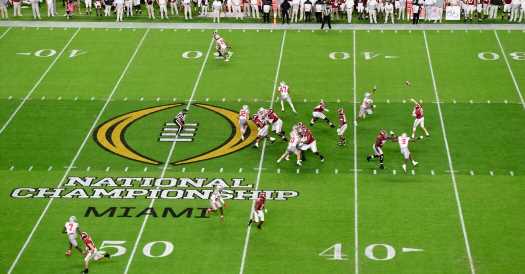The Electronic Arts college football video game franchise, long beloved by sports fans but paused indefinitely years ago when it was swept up in wrangling over the rights of student-athletes, will be revived, the game maker said Tuesday.
E.A. Sports did not announce a timeline for the release of the game, which was last published in 2013, but Cam Weber, a top executive, said Tuesday that the company was “eager to bring a new game to players in the next couple of years.”
Although scores of colleges stand to gain financially from the game’s return, players, at least for now, will not be paid, nor will their names or likenesses be used. But with the N.C.A.A. inching toward new rules on how students may profit off their fame, specific players could ultimately appear in the game, which, in a departure from much of its history, is not expected to carry the branding of the N.C.A.A.
Over the years, no consequence of the warring over players’ rights has resonated more broadly for college football fans than the demise of the E.A. college football games, which sold tens of millions of copies. Part of their appeal was their realism and the inclusion of the sport’s rituals, including mascots, fight songs and renderings of famous stadiums.
But the games were ultimately ensnared in litigation, and the N.C.A.A. and some powerful leagues, including the Big Ten and the Southeastern Conference, backed away from licensing their logos and names for the franchise. In September 2013, E.A. announced it was placing the series on hiatus.
At the time, Weber said “ongoing legal issues combined with increased questions surrounding schools and conferences have left us in a difficult position.”
Now, E.A. is building a game around generic players and a deal with the Collegiate Licensing Company, which works with schools to market and sell rights to their brands. The agreements, terms of which were not disclosed, will allow developers to use the stadiums, uniforms and logos of more than 100 colleges and universities.
Previous versions of the game often mimicked the looks and jersey numbers of players without naming them.
For its part, the N.C.A.A. is still debating how to allow college athletes to make money off their renown; in January, the association postponed a planned vote on new rules after the Justice Department raised concerns in the waning days of the Trump administration.
Ramogi Huma, the executive director of the National College Players Association, a players’ rights advocacy group, said he believed the wave of statehouse proposals to give athletes a chance to make money in new ways helped drive the return of the game.
Huma predicted, though, that the game would have less luster without the distinctive virtual presence of the players who star in real life on Saturdays during the season.
“This is an exciting development, but the game is not going to be the same without the players,” Huma said. “The timing reflects that. Without a clear path with the players, nothing happened. In order for E.A. Sports to have the type of quality that it had prior to ceasing production, you’ve got to have the players in there. Otherwise, the game will be a shell of itself.”
Huma said the N.F.L. Players Association’s group licensing agreement could be an appropriate model for college players, who are not currently unionized. But an accord like that one could prove thorny — or impossible — without a federal law on name, image or likeness or an N.C.A.A. arrangement.
Without a national framework, experts said, football players in states with legislation that will come into force in the coming years, like California and Florida, could be compensated for lending their likenesses to video games while players elsewhere would be left out.
The announcement by E.A., one of the biggest game developers, with flagship sports titles around international soccer and the N.F.L., comes at a time when online entertainment like gaming has surged because of the coronavirus pandemic.
Video game fans, both casual and hard-core ones, are logging more time on their phones, computers and consoles, and gamers worldwide spent a record $175 billion on software alone last year, according to an estimate by the gaming analytics firm Newzoo.
The November release of a new generation of gaming consoles, Microsoft’s Xbox Series X and Sony’s PlayStation 5, added to the hype and excitement, though both companies and other video game hardware makers have had pandemic-related supply problems amid huge demand.
Kellen Browning contributed reporting.
Source: Read Full Article





